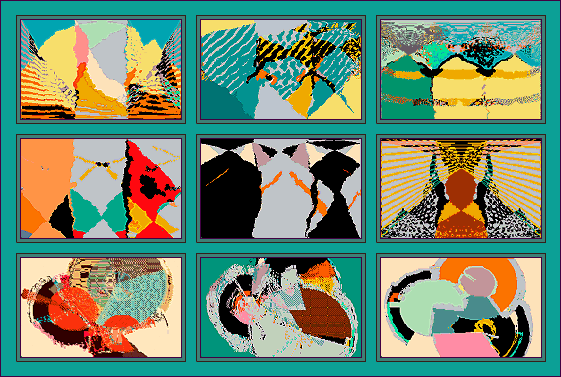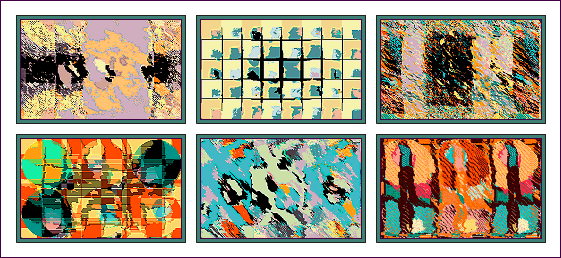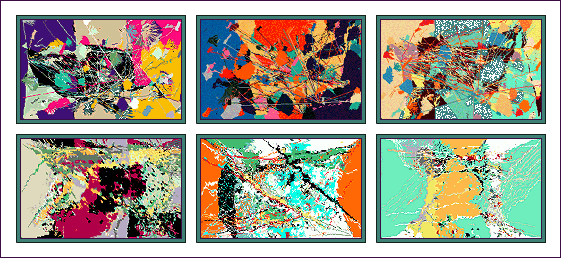|
Art Moderne
_____About this page
_____Copyrights |
|
_____About the graphics
When you view the graphics, you can look at different ways to them: As being abstract graphics that you like or not but, also with keeping in mind that they are Auto-Composed. This means that they are created by my software automatically - running an algorithm that produces unique variations, based on a certain creation concept. These algorithms were programmed in both GFA-BASIC and GFA-ASSEMBLER on the ATARI-ST computer. The main goal of my research in this field was to let the machine produce these graphics automatically without being just a calculator. The graphics are not calculated but created(!) and also created fast (less than a second up to some seconds). The idea behind my technique of creating software for this purpose is to reflect the composing 'game' - 'played' by the artist when making his abstracts. This is (or can be) a process of intuition, random behaviour and unexpected moves - with a backup of talent, experience (+mannerism) and inspiration. How to transfer this with a computer language? |
View sets of colour graphics:
The first set of six graphics were Auto Composed by a routine that is called MIR.
First, it starts to create an 'ugly' symmetrical picture (2nd row - right picture).
It is composing this continuously for a about 20 seconds. Some stages are displayed until
the time for this first composing stage is passed. Then, some hocus pocus
(secret of the cook) is done and sequentially - each 3 seconds - 9 pictures will appear
(like the first and last 2 that are displayed here). After this, the cycle starts again.
It is fun to see beautiful extractions appear that are based on the first 'ugly'
composing stage.
The 3 graphics at the lowest row were Auto Composed by a routine that is called CIR.
The base technique is straight forward (like the title CIRcles already suggests).
The base is created by drawing filled circles at 3 fixed center point at the screen.
These points are tuned carefully at a relative position from each other to achieve a
certain impact of the composition. The circles are drawn hidden (you will not see it
happen at the screen). Then certain manipulations are done (within 1 second) and the
result is shown at the screen. The CIR routine continues its work again by drawing
circles over the previous result and after the manipulation again a next result is shown.
The interval of the displayed results is 3 seconds. Usually (it has its own will) the
CIR routine starts with a result that counts little details and then grows towards more
detailed results. All of a sudden it can happen that the routine takes a refreshing
action to clean up the overkill on details.
These graphics were Auto Composed by various routines. Like with most routines,
first a base is drawn by using some elementary drawing primitives.
Then this base runs through several manipulation stages.
While each result is shown at the screen, the routine is already secretly busy with
taken some more elementary drawing actions and manipulations.
This means that each result that follows is a mutation of the previous one.
After a while it has grown towards a complete different graphic.
The first 3 graphics were Auto Composed by a routine that is called POL (after Polak,
the action painter). Basically, it is a very simple routine. The composition is
giving a certain 'direction' by using a background base with 3 rectangles and by
using line and spot drawing actions from two specific points. The sublimation of
the expression is done by a complex routine that forces straight lines and areas to
become more vibrated.
These graphics are Auto Composed by a routine that is called TFI (I forgot why).
The routine starts with drawing a rectangle and a halve circle. Then it draws lines
(this all happens secretly). After each session of line drawing there is some hocus pocus
done and the result is shown each 3 seconds. After a certain amount of sessions,
the routine starts again from the beginning.
View set of Black/White graphics:
You will enter a collection of Auto Composed graphics.
View more colour graphics:
The Moscow 1998 collection of Auto Composed graphics.
For response see This page and all contents: (C)1996 by Marc Marc Amsterdam

_____The MIR concept
_____The CIR concept

_____Various concepts

_____The POL concept
_____The TFI concept
In computer arts, there is plenty of glossy stuff in the range of realistics and
animation. All done with wizzy software. What about some abstracts?
Back to Art Moderne Index Back to MAIN Index
![]() Marc Marc contact file
Marc Marc contact file